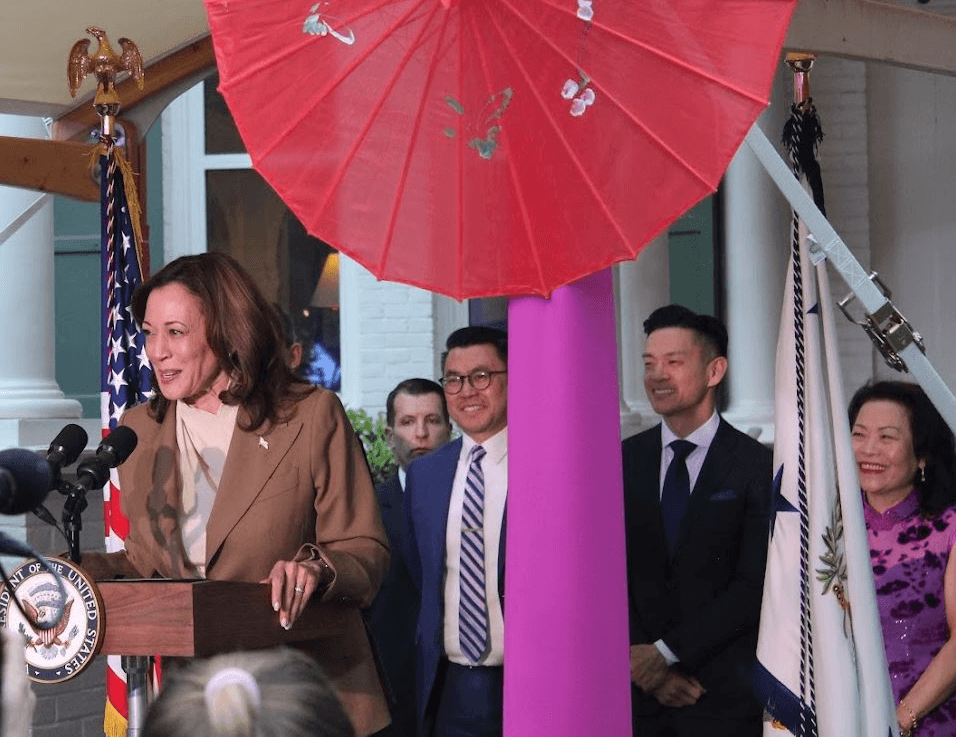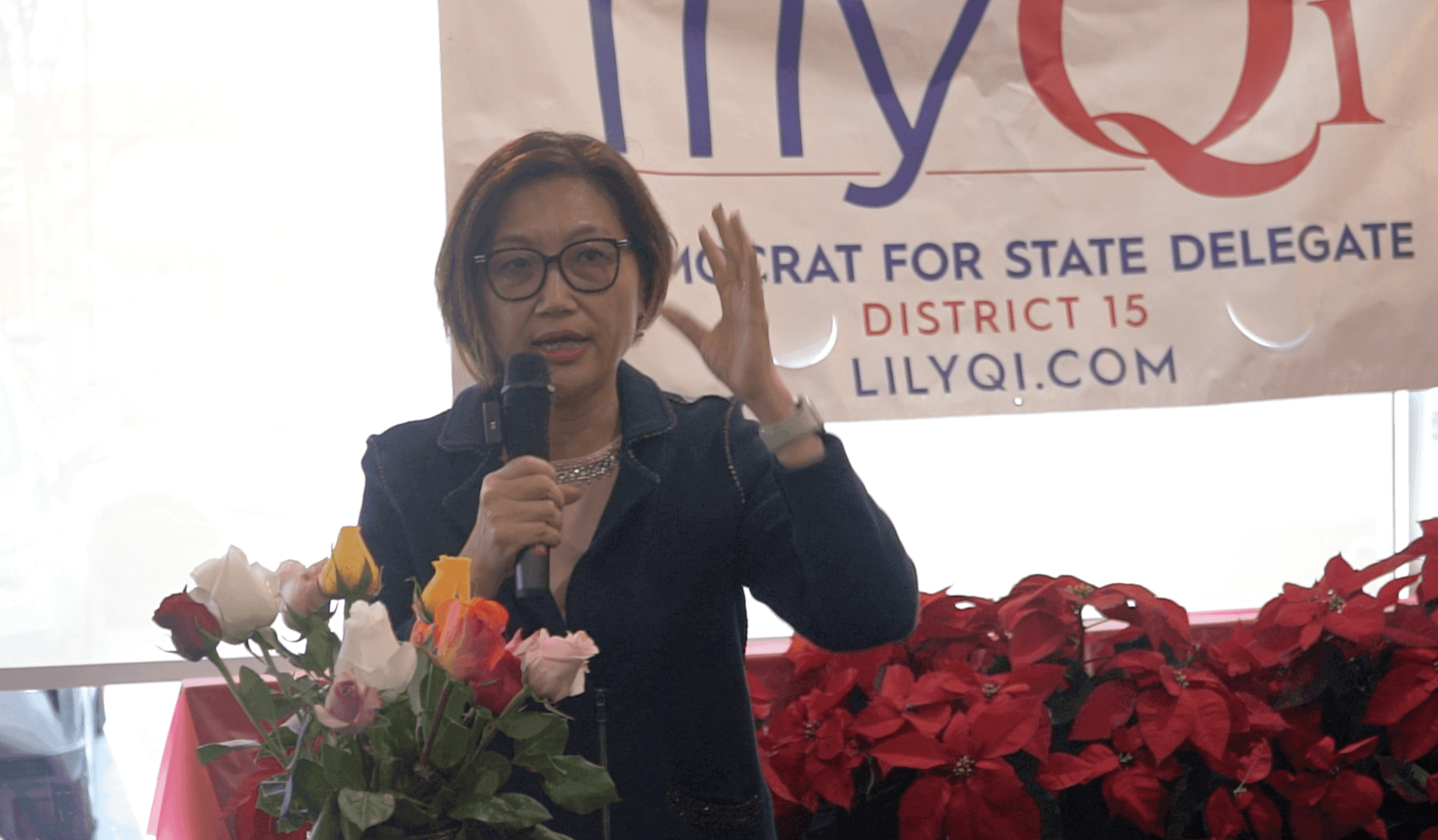Kamala Harris Doesn’t Like Playing the Identity Card, Asian Voters Aren’t Buying It Either

WASHINGTON – Asian Americans typically prefer not to have their accents highlighted. However, Kamala Harris underscored her mother’s accent in her keynote speech on the final night of the 2024 Democratic National Convention.
“My mother was a brilliant, five-foot-tall, brown woman with an accent. And as the eldest child, I saw how the world would sometimes treat her,” the Vice President mentioned her mother’s background to convey her understanding of the challenges immigrant families face.
Harris made the speech to accept her party’s nomination as the presidential candidate, and it was the only time during her address that she referenced her South Asian heritage.
If identity politics worked, Kamala Harris could win big. She would become the first Black American and South Asian American female president in U.S. history if elected this November. However, she has rarely played the identity card to appeal to specific minority groups, including Asian Americans and Pacific Islanders. That might be a smart choice, as AAPI voters don’t easily buy into it either.
The Asian American vote could become a decisive factor in the incredibly close 2024 presidential race. Over the past two decades, the Asian population grew by about 105%, reaching 21 million. It has recorded the fastest population growth rate among all racial and ethnic groups in the U.S., per the Pew Research Center. In the last presidential election cycle, Asian American voter turnout increased significantly by double digits. According to 2024 Asian American Voter Survey, 90% of Asian American voters plan to vote for the President, Congress and other offices this November.
For Asian American voters with South Asian backgrounds, Harris’s racial heritage makes her more relatable.
Dhaval Shah, the Treasurer of Maryland’s Howard County AAPI Council and the first Hindu individual elected to the Democratic Party in the county's history, expressed optimism about the party's chances in the upcoming presidential race with Harris as the candidate. Shah said he believed that having Harris at the top of the ticket would effectively inspire higher voter turnout among AAPI individuals “because we like to see people like ourselves.”
“There were very subtle ways in which I think her story was extremely relatable to folks who have immigrant backgrounds,” said Asma Khalid, NPR’s White House correspondent and also a South Asian woman, during an NPR Politics program discussing Harris’s speech at the DNC.
However, Harris’s mixed Asian racial background alone is not a compelling enough reason for Asian American voters to support her.
“No matter what your skin color is or where you come from, it doesn’t really matter,” said Judy, a 49-year-old Chinese American investment actuary who preferred not to share her last name. When asked if she would consider voting for Harris because of her racial background as an Asian woman, "it is not my biggest consideration," she replied.
For Judy, the economy and immigration policies were her top concerns when making voting decisions. Leadership skills and the ability to navigate foreign affairs were also important to her in choosing the next president, but race and ethnicity were not.
“I don't think minority ethnic backgrounds automatically make a person better,” said a 53-year-old Chinese American IT programmer who wished to remain anonymous for privacy reasons. She mentioned that she didn’t “feel much difference” between Joe Biden and Harris, aside from their ages.
Their voices were echoed in the 2024 Asian American Voter Survey released last month. Despite the rise in anti-Asian hate during the pandemic, racism and racial discrimination did not rank among the top 10 issues for Asian American voters. Instead, the economy, healthcare, and inflation remain the top three issues for the 2,479 registered Asian American voters who participated through telephone interviews and online surveys.
The racial background of presidential candidates is also not a primary issue for most Asian American voters. For example, although Nikki Haley, the former Republican presidential candidate who dropped out of the race in March, shares South Asian heritage, around 60% of Asian American voters view her unfavorably, and 14% of Asian American voters indicated they don't know enough about her.
For many years, Peter Kuo, the former California GOP Vice Chair and a Taiwanese American, voted for any political candidate with a Chinese last name, regardless of their party affiliations or agendas. However, this is no longer the case. Years ago, Kuo noticed that some of the politicians he voted for enacted bills that negatively impacted him when they were elected to state capital or Washington, D.C. Now, a similar racial background is not his top voting concern anymore. He also encourages other Asian Americans around him to be mindful of identity politics.

Peter Kuo, former California GOP Vice Chair. Photo by: Pingping Yin/Yuan Media
Even though a shared racial background is not the top voting concern, Asian American voters hold a higher favorability toward Harris than Donald Trump, the Republican presidential nominee and former President. According to AAPI Data, 44% of Asian Americans have a favorable impression of Harris, compared to 34% for Trump. It’s worth noting that the data was collected before Joe Biden withdrew from the race.
Judy began researching Harris's background, particularly after Biden dropped out of the campaign. She even discovered that Harris spent much of her student life in Canada before entering college. Based on what she learned, Judy felt that Harris lacked a clear vision on major issues facing the country, such as the economy and foreign affairs. However, despite identifying as a Republican, she favors Harris over Trump, saying, "She is not a perfect one, but in the current situation, she is the best we can have."
“Remember what life would be like if we had Trump as president,” said Rep. Judy Chu (D-CA), the first Chinese American woman elected to Congress. “He’s the one who put the target on our backs, calling COVID-19 ‘the China Virus’ and ‘Wuhan Virus,’ and that’s why there were 11,500 anti-Asian hate crimes and incidents!”
While openly endorsing Kamala Harris, Chu repeatedly emphasized the challenges faced by Asian Americans during Trump’s presidency, saying that if Trump were re-elected, life for Asian Americans, and Chinese Americans in particular, would be “horror and trauma.”
Although Chu acknowledged that Harris doesn’t like to be categorized by race or gender, she noted that Harris has been “very supportive” when Asian American federal legislators discuss AAPI issues on Capitol Hill. Chu interpreted Harris’s reluctance to highlight her race by saying, “she has to be a candidate for everybody.”

As a Congresswoman from California, where Harris previously served as the state’s attorney general, Chu stressed Harris’s legal background when discussing her presidential candidacy, contrasting it with Trump’s indictments.
“She knows the law, and she was the enforcer of law. Donald Trump, on the other hand, is a criminal. He had 34 felony convictions and has numerous other trials that show that he's terrible. He has no respect for the law. So who is for law and order? Is it the prosecutor, or is it the criminal felon?” Chu said.
Rep. Judy Chu(D-CA) at an AAPI event in July. Photo by: Pingping Yin/Yuan Media
Compared to her racial background, Harris leaned much more on her past as a prosecutor. During a campaign rally in Milwaukee, held less than a week after the Republican National Convention, Harris underscored her long career as a prosecutor, stating that she has taken on perpetrators of all kinds:
"Predators who abused women, fraudsters who ripped off consumers, cheaters who broke the rules for their own gain," she said. "So hear me when I say, I know Donald Trump’s type."
Her career in justice and her strong stump speeches resonated with many Asian Americans more than her South Asian heritage.
“I would focus more on her policies and leadership skills. Although her background is unique, it is her actions and ideas that matter most to me,” said a 50-year-old Chinese American Democrat working in academia, who preferred not to share her name, explaining why she was thrilled about Harris's candidacy.

 Pingping Yin
Pingping Yin Ethan Mao
Ethan Mao John Gao
John Gao Hansen Zhang
Hansen Zhang



